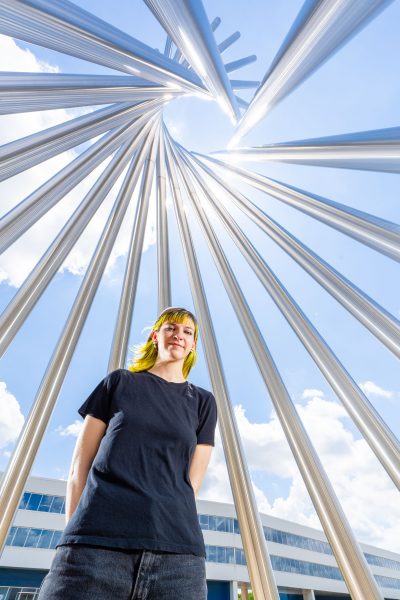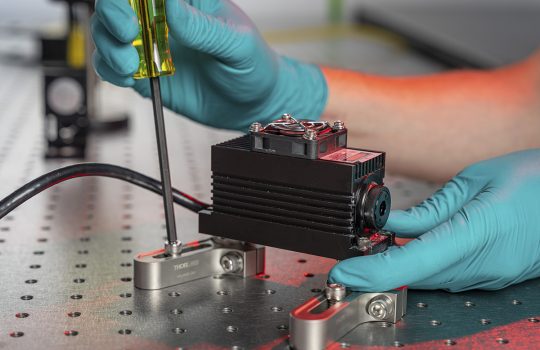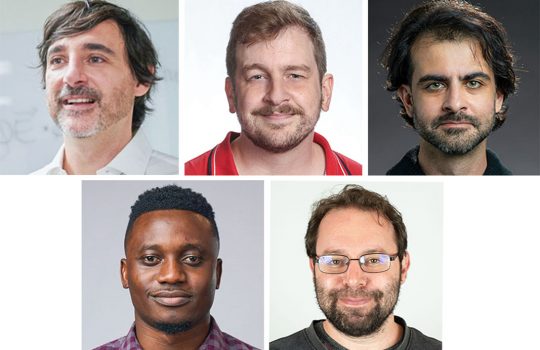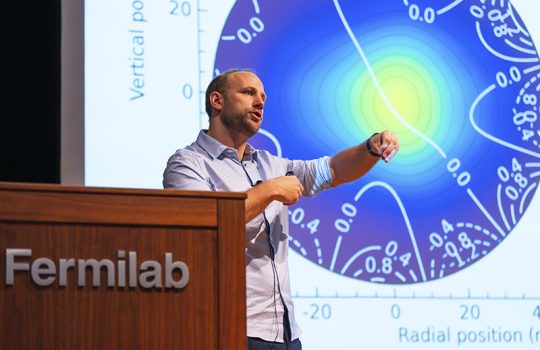What do you do at Fermilab?

I’m a mechanical technician with SQMS, which is part of the National Quantum Initiative. My job is to assist researchers by doing the physical work necessary for their research and experiments. I clean, prepare, assemble and install experiments into the dilution refrigerators here at Fermilab, as well as help maintain the fridges and supporting equipment. Recently, we just built out the eighth dilution refrigerator for SQMS.
A big part of my work is done inside a clean room or working on a fridge, so maintaining a clean environment, paying close attention to details and being cautious while handling components is very important.
Another important aspect of my job is keeping safety in mind and carefully following all the necessary processes and procedures. Twice a week, we top off the external cold traps with liquid nitrogen to keep the fridges running smoothly, and often, we’re working with power tools or modifying parts in the tech shop, so a crucial part of my work is being aware of the proper way to do what needs to be done and doing it safely.
How long have you worked at Fermilab?
I started in May of 2023, so I just celebrated two years here at Fermilab. I’ve been learning a lot about how the dilution refrigerators work and all the different components that go into them, as well as how important working with other departments within the lab is. I’m very excited to continue learning and being a part of something as important and interesting as SQMS.
Before working at Fermilab, I worked at a very small pet store and animal rescue for a little over three years. Working there, I learned a lot about patience and paying close attention to details, because it could be the difference of life and death for a lot of the animals. This job taught me about safety, proper personal protective equipment, hazard awareness and problem-solving skills. I also learned most of my mechanical skills and people skills there.
What is the most challenging part of your work?
The most challenging part of my work is troubleshooting and trying to come to a middle ground between the ideals of the researchers and the reality of what is possible on our side with time and materials.
There are many projects within and outside of our department that may have competing schedules and needs. or we may not have the materials to build up one experiment because they are being used elsewhere. It can be challenging with seven operational fridges if we have several open at the same time with multiple experiments, changes to be made, parts to be washed, and assemblies to be done.
When plans don’t go as we hoped, or equipment fails or plans change, then we must troubleshoot and find a solution and oftentimes find the root of the problem as well. I’ve been learning a lot through watching how everyone works towards a solution to these challenges.
What is the most rewarding part of the work you do at Fermilab?
I really enjoy being part of the process that brings concepts to life. I get to see a project go from a drawing, the parts come in and I get to do my work cleaning and assembling them. Next is installing and thermalizing them, and finally, closing the fridge and waiting. At the end of the test, I help open the fridge and prepare to start working on their next test!
I love working with my hands, and I am really happy with the amount of hands-on work I can do here at Fermilab. Puzzles and problem-solving are a big part of who I am, and I feel like I am presented with a lot of good opportunities to think and try to figure out the best way to accomplish a task or work through an obstacle, although I still have a lot to learn.
What do you do for fun outside of work?
I’m really interested in all different types of music, so I’m often going to concerts, EDM shows and festivals. Recently, I traveled to Montreal and even did a road trip to Philadelphia for some riddim shows, and I just got back from Detroit for another one. I love to travel around to enjoy music and make new friends.
I also really love cooking and baking in my free time. Over the past few months, I’ve spent time perfecting my own extra-chewy chocolate chip cookie recipe. I often bake for my friends and like to learn how to make new things. I try to make as much from scratch as possible because I like learning the process and figuring out how each ingredient plays its part in the end result.
Fermi National Accelerator Laboratory is America’s premier national laboratory for particle physics and accelerator research. Fermi Forward Discovery Group manages Fermilab for the U.S. Department of Energy Office of Science. Visit Fermilab’s website at www.fnal.gov and follow us on social media.
The Superconducting Quantum Materials and Systems Center at Fermilab is supported by the DOE Office of Science.
The Superconducting Quantum Materials and Systems Center is one of the five U.S. Department of Energy National Quantum Information Science Research Centers. Led by Fermi National Accelerator Laboratory, SQMS is a collaboration of more than 30 partner institutions — national labs, academia and industry — working together to bring transformational advances in the field of quantum information science. The center leverages Fermilab’s expertise in building complex particle accelerators to engineer multiqubit quantum processor platforms based on state-of-the-art qubits and superconducting technologies. Working hand in hand with embedded industry partners, SQMS will build a quantum computer and new quantum sensors at Fermilab, which will open unprecedented computational opportunities. For more information, please visit sqmscenter.fnal.gov.



